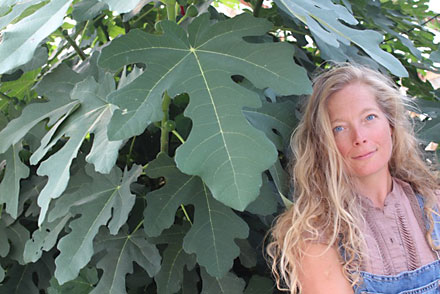Cory and Shawn Klehm want to get school kids excited about growing and eating food.
Iowa is a farm state. Whether you’re driving through or flying over, endless rows of corn curving around the horizon await you. Ninety percent of the land is used for agriculture—growing commodity crops like corn and soybeans, as well as raising chickens, hogs, and cattle. These are large-scale business operations focusing on yield and efficiency. Most of what they grow is not for human consumption and not for local communities.
But there is a new breed of farmers, many of them young, who are growing organic food for the local market, and their priority is not the bottom line. These enthusiastic growers care about nutrient-dense food, land stewardship, and harmony with nature.
The Part-Time Farmer
Cory Klehm and his wife Shawn are two idealistic farmers with a mission. “Growing food gives me a sense of doing something for the community,” Cory says, “especially the youth, to educate the kids and to give them an opportunity to be healthier.” The Klehms are lucky to own a farmstead where they grow dozens of different vegetables and fruits without the use of pesticides and fertilizers. Working on the farm is also a way to connect with their three teenage children and teach them about the value of working the land.
They run a small CSA (Community Supported Agriculture) program where customers pay for a season of produce and pick it up weekly from the farm. The rest of their harvest is sold at the farmers’ market or to the Fairfield School District. They are taking the lead to establish a farm-to-school program to give kids access to more fresh produce.
But farming is not their main occupation. They both teach at the Fairfield Middle School, and they use their farm to educate children about the value of locally grown produce. Cory says that some of the kids never eat fresh produce. They take students out to their farm, and in the classroom, Cory teaches children how to grow vegetables. They start the seeds together and then students take the seedlings home to plant and nurture. His goal is to get the kids to appreciate the work that goes into growing the food and learn about the nutritional and health benefits of fresh, unprocessed foods.

Faith Reeves runs the community garden at Sky Factory. (photo by Taylor Ross)
The Business-Supported Farmer
What is a young wanna-be farmer to do when she cannot afford to buy land and can’t get a loan? With a new model that Fairfield company Sky Factory introduced, an aspiring farmer can create an organic garden on the company’s grounds and grow fresh produce, which benefits the employees, too.
Faith Reeves has managed the Sky Factory Farm for five years. The 3.5-acre perennial food forest provides fruits and vegetables to 40 employees. Over the years, Faith has tuned into what the employees like. After trying the weekly CSA model of dividing the week’s harvest into equal shares, she decided to change the system. “Not everyone likes beets and turnips,” she says. Now she displays the day’s harvest in the company foyer, and employees can take what they want.
“I have some die-hard, courageous vegetable consumers and I have some that don’t want to stretch their palate,” she says. “But I want to expand their horizons on taste, nutrition, and variety.”
Faith’s mission is to grow nutrient-rich food and teach others to do it, too. She also wants her garden to become an outdoor oasis where employees can take a break, enjoy the birds, dragonflies, and bullfrogs, and volunteer in the garden. The focus of the farm is not production; it’s a demonstration of how a business can use its campus to benefit the employees’ health and well-being.

Organic produce grower Kris Johnson sells at the Fairfield Farmers’ Market, with Sheila Higgins, right.
The Freelance Farmer
An eager farmer with enough entrepreneurial spirit can also lease land from a property owner who doesn’t want to cultivate it himself.
That’s what Kris Johnson is doing. He manages an orchard for one landowner and experiments on another piece of land with sustainable farming techniques. He also leases a greenhouse built for a farm-to-school project that didn’t pan out.
Kris is a fourth-generation Iowa farmer with a passion for farming. He studied environmental science in college and graduated with a new perspective on how farming should be done. He favors alternative agricultural methods over conventional ones. “Fairfield is a lucky place,” Kris says. “The community is receptive to and demands organic food, so it’s a good place for a farmer like me.”
Now in his first growing season, Kris is still learning how to maximize production. The greenhouse uses recycled hot water from an adjacent manufacturing plant, making it possible to grow year round. He hopes to revive the farm-to-school project because he is concerned about the health of the next generation.
“Most of the food we eat is processed and devoid of nutrition,” he says. “We waste fossil fuels and man hours for transportation. Growing fresh, local food is my first step to fixing some of the problems I see in the world.”
Young farmers graduating from sustainable agriculture programs around Iowa are eager to change the agricultural paradigm. They want to grow quality, chemical-free food in a sustainable way, and they’re pursuing new markets to be able to offer healthy food to a larger audience. In order for them to be successful, we, the customers, need to think about how we can change the way we shop and eat to support these farmers, our local economy, and the health of our environment.
Livia Cole is a freelance writer and co-producer of an upcoming short documentary about the Fairfield local food scene.
